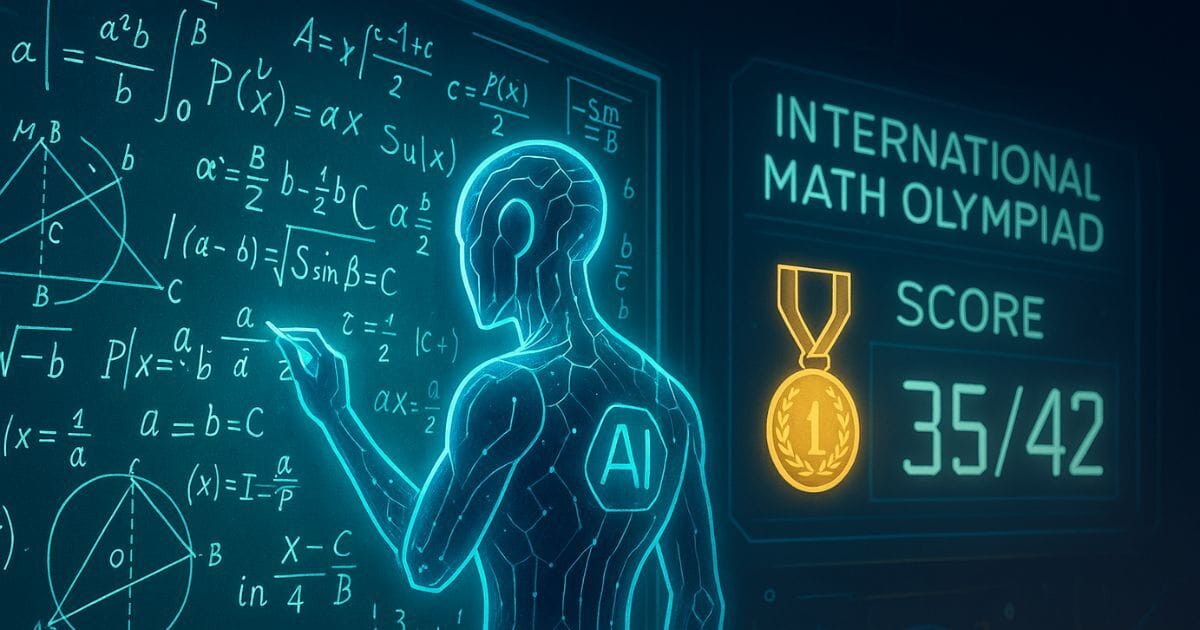- H-FARM AI's Newsletter
- Posts
- OpenAI Model achieves Gold at International Math Olympiad
OpenAI Model achieves Gold at International Math Olympiad
PLUS:Perplexity eyes Smartphone pre-installation for Comet Browser & Google DeepMind unveils Backstory Image tool

In today’s agenda: |
|
MAIN AI UPDATES / 21 th July 2025
🏆 OpenAI Model achieves Gold at International Math Olympiad 🏆
Experimental AI solves 5 of 6 complex problems matching human mathematics
OpenAI has achieved a major AI milestone with an experimental research model earning "gold medal-level performance" at the International Math Olympiad (IMO), solving 5 out of 6 problems and scoring 35 out of 42 points. Research scientist Alexander Wei announced this "longstanding grand challenge in AI" breakthrough, noting the model demonstrated human-like reasoning on extremely difficult algebra and pre-calculus problems that typically require creativity and complex decision-making.
The IMO competition sees countries send up to six students to tackle seemingly simple but highly challenging exercises, with only 67 of 630 contestants (roughly 10 percent) receiving gold medals this year.
Wei emphasized the model can "craft intricate, watertight arguments at the level of human mathematicians," representing a significant leap in AI's reasoning capabilities beyond typical complex datasets and repetitive actions. However, both Wei and CEO Sam Altman confirmed this advanced math capability won't be available to the public for several months, meaning GPT-5 will likely improve over its predecessor but won't feature IMO-level performance.
📱 Perplexity eyes Smartphone Pre-Installation for Comet AI 📱
Nvidia-backed startup targets Chrome dominance with OEM partnerships
Nvidia-backed Perplexity AI is in discussions with mobile device manufacturers to pre-install its Comet browser on smartphones, CEO Aravind Srinivas confirmed to Reuters. The strategy aims to capitalize on browser "stickiness" where users tend to stick with pre-installed or default browsers, potentially driving habitual use of Perplexity's AI tools.
Srinivas acknowledged the challenge, stating "It's not easy to convince mobile OEMs to change the default browser to Comet from Chrome," referencing the dominance of Google's Chrome (70% mobile market share) and Apple's Safari (24% combined with Samsung browsers).
Comet, currently in desktop beta, integrates Perplexity's AI directly into web browsing, allowing users to query personal data like emails and calendars, schedule meetings, and summarize content. The company plans to stabilize the product for hundreds of thousands of desktop testers before scaling to "tens or hundreds of millions" of mobile users next year. This move follows Google's refusal to list Perplexity as a default search engine option on Chrome and comes as OpenAI reportedly develops its own agentic browser for complex task automation.
🔍 Google DeepMind unveils Backstory Image Verification Tool 🔍
Convert complex documents to clean digital formats
Google DeepMind has introduced Backstory, an experimental AI tool designed to help users explore the context and origin of images seen online. Built using Gemini models, Backstory investigates whether an image was AI-generated, tracks when and where it's been used online, and determines if it's been digitally altered.
The tool goes beyond simple AI detection by taking a holistic approach to assess image trustworthiness through comprehensive context analysis. When given an image and written prompt, Backstory quickly equips users with helpful information, responds to further questions, describes how images have been used, and tracks how their story may have changed over time.
The system generates easy-to-read reports and recognizes that determining AI-generation doesn't equal assessing trustworthiness - real images can be misleading when altered or presented out of context, while AI-generated images may support authentic, creative, or factual stories.
INTERESTING TO KNOW
🧠 Meta's "List of 44" Superintelligence Team leaked 🧠
A leaked list revealing Meta's 44-person Superintelligence team has sparked industry-wide speculation about the company's AGI ambitions and aggressive talent acquisition strategy. The elite AI team, handpicked by Mark Zuckerberg, includes researchers poached from OpenAI, DeepMind, Apple, and Anthropic with compensation packages ranging $10M-$100M annually.
Key demographics show 50% are of Chinese origin, 40% are former OpenAI employees (including GPT-4o contributors), and 75% hold PhDs from institutions like MIT, Stanford, and Tsinghua. Confirmed members include Trapit Bansal (chain-of-thought reasoning expert), Shuchao Bi (GPT-4o voice mode co-developer), Jack Rae (Gemini designer), Alexandr Wang (former Scale AI CEO, now Meta's Chief AI Officer), and Nat Friedman (ex-GitHub CEO). The team's charter focuses on "safe, open, and frontier superintelligence" to rival GPT-5 and Gemini-Ultra, representing Meta's transformation from social media company to first-tier AI contender.
🦆 DuckDuckGo adds AI Image Filter to Search Results 🦆
Privacy-focused browser DuckDuckGo has launched a new feature allowing users to filter out AI-generated images from search results, responding to user feedback that AI images interfere with finding relevant content. Users can access the feature through the Images tab dropdown menu labeled "AI images" with options to "show" or "hide" AI content, or enable it permanently in search settings via "Hide AI-Generated Images" option. The feature addresses the growing problem of AI slop - low-quality media content created using generative AI technology that's flooding the internet. DuckDuckGo's filter relies on manually curated open-source blocklists, including the "nuclear" list from uBlockOrigin and uBlacklist Huge AI Blocklist.

📩 Have questions or feedback? Just reply to this email , we’d love to hear from you!
🔗 Stay connected:
